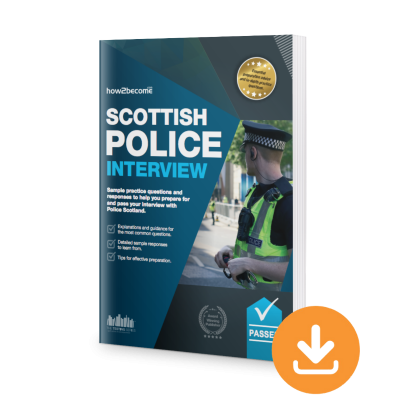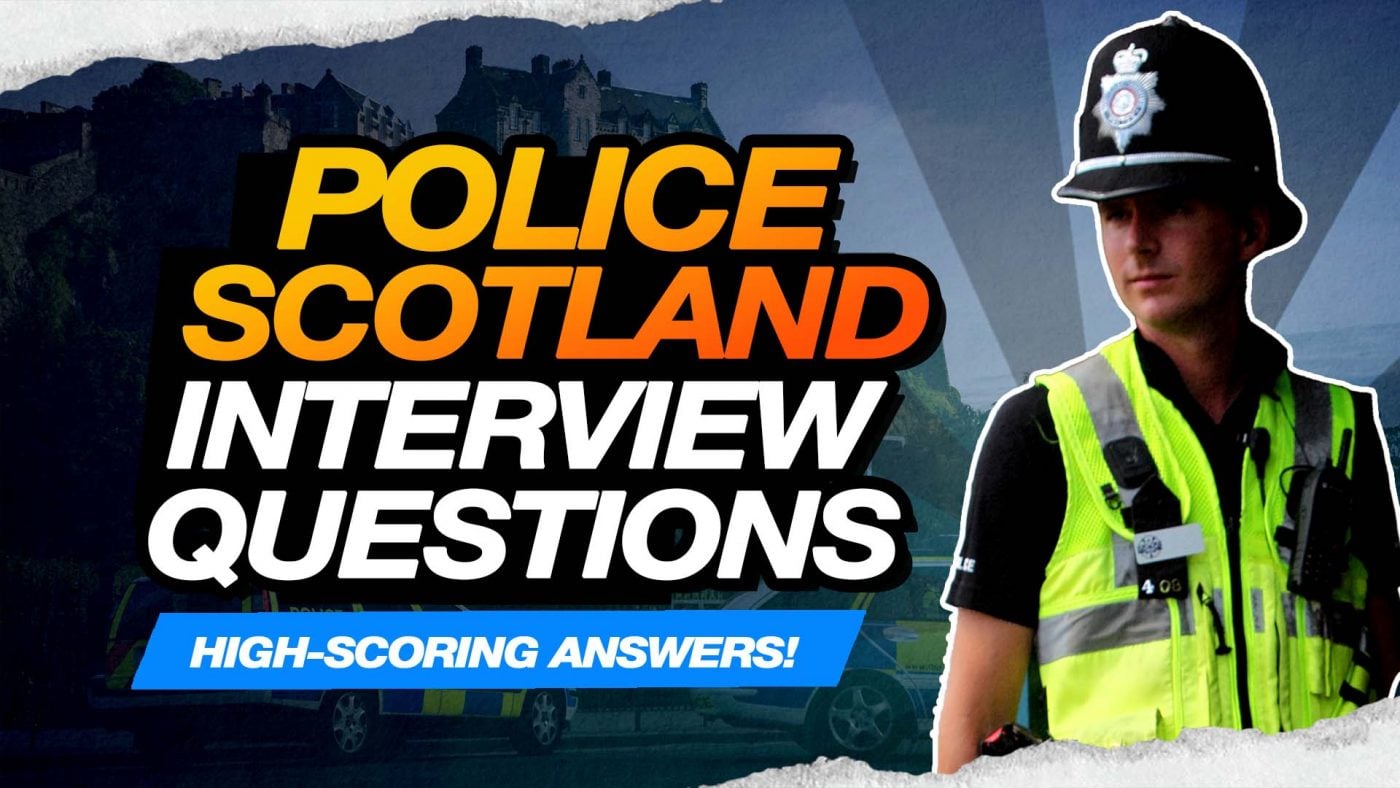POLICE SCOTLAND INTERVIEW QUESTIONS AND ANSWERS (Police Scotland Competency Interview Questions)
Do you have a Police Scotland interview coming up? In this article we will take a look at how you can ensure you pass your Police Scotland competency Interview!
Here is what we will cover:
- A list of Scottish Police interview questions to prepare for.
- Sample ANSWERS to those questions to help you SUCCEED.
- Essential tips for passing your Police Scotland interview.
Police Scotland Competencies and Values Framework
The following Competencies and Values are ESSENTIAL to PASSING the Interview Stage (You WILL be SCORED against these!)
There are four values consisting of:
- INTEGRITY
- FAIRNESS
- RESPECT
- HUMAN RIGHTS
INTEGRITY: Provide a consistent service for the community, which is in the best interest of the community and Police Scotland. You build relationships and act as a role model, using impartiality when making decisions and are responsible for your own actions.
FAIRNESS: You take into the account the needs of others on an individual or group basis and deal with any issues in a fair, controlled and tolerant approach showing the correct levels of understanding and empathy.
RESPECT: Delivering professional and consistent police services to the public whilst acting considerately and appreciative to the needs of the community.
HUMAN RIGHTS: It is your duty as a police officer to protect the human rights of others and show equality, no discrimination and respect to all.
There are also what Police Scotland calls “clusters”, which is essentially a group. There are three clusters, or groups, on the framework each consisting of 2 further competencies. These include:
Resolute, compassionate and committed (so this group, or cluster as Police Scotland calls it, contains the following two competencies):
- We are emotionally aware: Police officers take the time to be understanding of themselves, colleagues and the people who they serve.
- We take Ownership: Police officers show great levels of responsibility and accountable for their own actions.
Inclusive, enabling and visionary leadership
- We are collaborative: This relates to working with others to provide an improved service to our communities.
- We deliver, support and inspire: Police officers share the organisations vision and mimic the values in their day-to-day activities.
Intelligent, creative and informed policing
- We analyse critically: Police officers will analyse data, information and viewpoints to combine the most comprehensive evidence not only to make decisions, but to understand the initial cause of issues in complicated situations.
- We are innovative and open-minded: Police officers are inquisitive by nature and look to further improve the services which they provide or to assist others with issues.
Okay, now let’s look at the first Scottish Police interview question I suggest you prepare for, which is Tell me about a time when you witnessed unacceptable behaviour.…
Q. Tell me about a time when you witnessed unacceptable behaviour.
TIP: This question tests how you align with the competencies and values of Police Scotland – all police officers are expected to challenge unacceptable behaviour.
Therefore, this question is essentially asking you to confirm that you have what it takes to challenge poor behaviour.
Notice that the question doesn’t ask you to demonstrate that you challenged this behaviour, but of course it would reflect very poorly on you if you didn’t, and therefore, you MUST to show that you did.
Example answer:
“Whilst working as a sales person for my previous employer, I was serving a lady who was from an ethnic minority background. I was helping her to choose a gift for her son’s 7th birthday when a group of four youths entered the shop and began looking around at the goods we had for sale.
They began to make racist jokes and comments to the lady. I was naturally offended by the comments and was concerned for the lady to whom these comments were directed. Any form of bullying and harassment is not welcome in any situation and I was determined to stop it immediately and protect the lady from any more harm.
The lady was clearly upset by their actions and I too found them both offensive and insensitive. I decided to take immediate action and stood between the lady and the youths to try to protect her from any more verbal abuse or comments.
I told them in a calm manner that their comments were not welcome and would not be tolerated. I then called over my manager for assistance and asked him to call the police before asking the four youths to leave the shop.
I wanted to diffuse the situation as soon as possible, being constantly aware of the lady’s feelings. I was confident that the shop’s CCTV cameras would have picked up the four offending youths and that the police would be able to deal with the situation.
After the youths had left the shop I sat the lady down and made her a cup of tea whilst we waited for the police to arrive. I did everything that I could to support and comfort the lady and told her that I would be prepared to act as a witness to the racial bullying and harassment that I had just witnessed.
I believe the people acted as they did because of a lack of understanding, education and awareness. Unless people are educated and understand why these comments are not acceptable, then they are not open to change. They behave in this manner because they are unaware of how dangerous their comments and actions are. They believe it is socially acceptable to act this way, when it certainly isn’t.
I also feel strongly that if I had not acted and challenged the behaviour the consequences would be numerous. To begin with I would have been condoning this type of behaviour and missing an opportunity to let the offenders know that their actions are wrong (educating them). I would have also been letting the lady down, which would have in turn made her feel frightened, hurt and unsupported.
We all have the opportunity to help stop discriminatory behaviour, and providing we ourselves are not in any physical danger, then we should take positive action to stop it.”
Q. Can you give me an example of a time when you have used good communication to solve a difficult problem?
TIP: This question wants you to demonstrate your proficiency with communication and how you have used it to RESOLVE A PROBLEM.
Show the interviewers that you can use effective communication in a positive and effective manner – to help serve the public.
This is a great opportunity to show you can take ownership, innovate, collaborate, inspire, think critically, and potentially more!
Example answer:
“For the majority of the modules on my degree, I was required to perform a group presentation. This presentation formed a part of the final mark for that module.
In one particular module, I was placed in a presentation group with 3 foreign students who struggled with the English language. When you are presenting, you are awarded marks for communication. Therefore, a failure to speak in clear sentences could have resulted in us being penalised.
I realised that, in order for us to succeed, I would have to take leadership of the group. I arranged an initial meeting in order to establish what roles everyone would have in the presentation, where I listened to everyone’s strengths and weaknesses and collectively came up with a plan of action.
I felt that it was important for every single member of the group to demonstrate that they could communicate effectively, and speak in the presentation. Therefore, I wrote out some very basic material for them to read, so everyone would gain a communication mark. When it came to the presentation, I took on the majority of the speaking, but made sure that everyone else had a turn.
Without my input, I feel that the members of the team would have struggled to communicate or even organise a meeting. I was responsible for organising which part of the presentation each member would be responsible for, as well as creating PowerPoint slides and written content. We ultimately received a 2:1 for the presentation, and were awarded a 9/10 for communication.”
Q. Describe a time when you had to use your initiative.
TIP: This is a common question that you are likely to face, or a variation of, as once again it allows you to demonstrate to Police Scotland that you MATCH many of their VALUES & COMPETENCIES.
For example, you can demonstrate that you are innovative and open-minded, we take ownership, and integrity.
Example answer:
“During a previous role, it was late one Friday afternoon and the company’s website went down. This was particularly problematic for a few reasons, not least that the manager had already gone home, and the company had a big weekend sale planned for the website.
I was unable to contact my manager who had left me in charge to get the final preparations made for the website sale. I understood I needed to remain calm, take responsibility, and ensure the website got back online before leaving work that evening.
The company’s procedure for website issues was to use a contracted IT developer, however, after reaching them, they were not in a position to help at that time. I therefore decided to do some research online and managed to find an online freelance IT developer using the website UpWork.com.
I vetted the freelancer using the website’s tools and I also had a quick call with them to ensure they would be able to handle the issue swiftly and professionally.
Despite their English not being very good, I managed to explain the problem in sufficient detail and within the next hour the website was back up and running again.
Finally, I ask the developer to create a step-by-step guide of what to do in case the issue ever happened again so that the company could get back up and running as quickly as possible.
By taking responsibility, remaining calm, and using my initiative, I was able to get the website back up and running again and the website sale was able to go ahead as planned.”
UNLOCK 21 Police Scotland Interview
Questions and Answers today + Get FREE Access to our BESTSELLING Online Police SET Training!

- The 21 Scottish Police interview questions that will likely come up in your interview!
- Full answers to each of the questions so you can learn how to deliver successful answers of your own.
- Suggested answers verified by our panel of interview experts and a former member of the emergency services;
- Sent to your email inbox within seconds of your order being placed.
- Covering both competency and values based questions and answers;
- Free interview bonus training material not available anywhere else!
- PLUS FREE 30 days access to our BESTSELLING online SET Training Suite with every order!
SPECIAL OFFER £15.00 TODAY’S PRICE ONLY: £10.97 +vat

